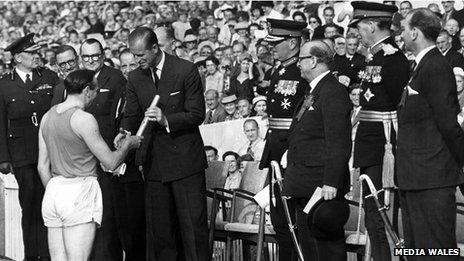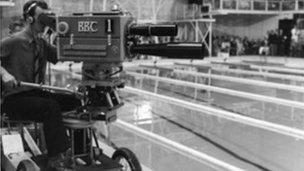Cardiff Empire Games 1958: A 'triumph' for Wales
- Published

Welsh rugby star and 1948 silver medallist sprinter Ken Jones handed the baton containing the Queen's message to Prince Philip at the opening ceremony
As Cardiff prepares to welcome the footballers who will play the first event of the London 2012 Olympics, the city is marking its own sporting anniversary.
It was 54 years ago this month that Cardiff hosted the sixth Empire Games - the forerunner of today's Commonwealth Games.
Many doubted Wales' ability to pull it off, as it was the smallest nation ever to host the games.
But from the moment 1,100 athletes from 35 competing nations descended on Cardiff Arms Park for the opening ceremony, those who were there say they witnessed an event which would change Wales forever.
"At the time there hadn't been much fuss made in Wales about the Games; certainly nothing like we've seen with these Olympics," said Prof Peter Stead, a cultural and social historian.
"In fact on the way up to Cardiff from Swansea as a 14-year-old schoolboy, I was a little underwhelmed at the lack of crowds and atmosphere.
"But as soon as you set foot in the Arms Park, and saw the gathering of elite athletes from all over the globe, you could feel a sense that Wales had become a grown-up member of the world community."
World attention focused on the 1958 Games, perhaps more so than on any that had gone previously.
Cardiff had originally been selected to host the event in 1946, but that had been unable to go ahead due to the upheaval following World War II.
The Games were to be the last at which South Africa would compete until the end of apartheid and were characterised by a number of protests against the selection of a whites-only South African team.

The host broadcaster set up a temporary base, near the Empire Pool, to cover the Games
It was also the first competition since the reality of a disintegrating British empire had prompted the organisers to restyle themselves as the British Empire and Commonwealth Games.
'Sense of confidence'
And with 23 of the 35 competing teams winning medals, Prof Stead believes the true legacy of the Games was that new things had become possible for tiny nations - and nowhere was that felt more strongly than in the host city.
"You have to remember that at this stage Wales had only just got its own secretary of state, and Cardiff hadn't long been confirmed as the Welsh capital," he said.
"It was only as a result of the success of the Wales team in these Games, that the government was finally forced to officially recognise the Red Dragon as the flag of Wales."
"There wasn't the same sort of secessionist spirit here as you had from many of the African and Caribbean nations, but it did give Wales a sense of confidence in our own identity, starting a process which led to the establishment of the National Assembly, and which is still on-going today."
But at the time, media attention focused on the Welsh team's strong showing rather than the long-term legacy.
They secured a best-ever 11th place in the medal table, with a haul of one gold, three silver and seven bronze.
Six of the medals came from the boxing team, including Wales' only gold from featherweight Howard Winstone.
'Laid the foundations'
According to boxing historian Wynford Jones, this was to leave its own legacy.
"You could argue that of that '58 boxing team, only Howard went on to have a professional career at the very highest level, but that's only half the story," said Mr Jones.
"The attention which the Welsh boxing success gained at those Games made the amateur sport so much more popular around Wales, and laid the foundations for the great Welsh boxers of the 60s and 70s, such as Johnny Owen.
"The same thing happened with athletics, and you could argue that Lynn 'The Leap' [Davies] owes his Olympic gold at Tokyo to the Empire Games in Cardiff."
But perhaps those who are still not convinced of the potential of the London Olympics should listen to the words of 1958 team manager, legendary Welsh rugby winger and 1948 silver medallist sprinter, Ken Jones:
"The triumph of Wales and Cardiff in staging the sixth British Empire and Commonwealth Games is now history - and history that will ring down the years to come."
- Published25 May 2012
- Published7 November 2011
- Published3 February 2011
- Published19 September 2010